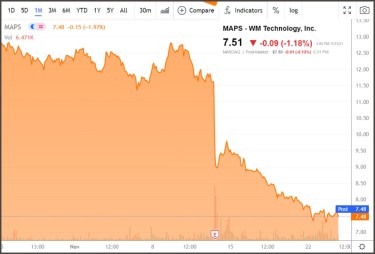
Is Weedmaps Listing Illegal Cannabis Dealers Again To Boost Sales As Their Share Price Plunges Over 85%?
Recent complaints filed with state and federal regulators in California have alleged that Weedmaps maintains lists of illegal marijuana retailers and products. For those who don’t know, Weedmaps is one of the cannabis advertising giants, which makes these allegations very serious. Our friend John Schroyer from MJ BIZ Daily brought the full story, which you can read here. Is there any truth to the allegations, what can we expect in response from Weedmaps and what may be the possible implications now that it is a public company and is federally regulated? These and many more are the issues this article aims to address, so read on and let’s dive right in.
The complaints at issue were filed with the California Department of Cannabis Control (DCC) in May and with the US Securities and Exchange Commission (SEC) in June. The complaints allege that Weedmaps’ leadership allows large amounts of cannabis activity on black markets without making changes they agreed to last year to disallow illegal cannabis deals on their map or website. The complaint alleges that the black market activities on the platform are directly affecting the growth of licensed businesses. This is because Weedmaps gives such operators a competitive advantage through the reach and capacity of its website. The complaints also made it clear that these actions by Weedmaps explicitly undermine the legal cannabis marketplace the organization seeks to serve.
It is up to the regulators to which complaints were made against Weedmaps to determine whether the allegations are valid. If this happens, the body faces hefty fines. This is bound to have a major impact on the cannabis industry in the US, as Weedmaps remains one of the top US cannabis companies. We haven’t seen the end of this ordeal as this isn’t the first time Weedmaps has faced problems related to illegal advertising.
A similar case surfaced four years ago, which eventually led to such ads being removed from their website in 2020. The company came under fire from regulators in 2018 when it issued a letter against such advertising practices. The company hid under the protective umbrella of an online platform to deny the claims. Nonetheless, it made a U-turn to begin requiring state license numbers in January 2020. Many believe this was just because the company was supposed to go public on the Nasdaq in 2021 before making its public debut in June 2021.
These present complaints were filed by executives of Canex Delivery, a Los Angeles marijuana company. In their complaint, executives said they complained directly to Weedmaps, but the company took no decisive action. Canex CEO Jim Damask and its Chief Financial Officer Joseph Bitzer were able to provide screenshots and documents to support their claims.
From the allegations, Canex claimed it lost nearly tens of millions of dollars as a result of Weedmaps’ activities. The company went further, accusing Weedmaps of selling ads to improve its bottom line by misleading investors. These unethically increase the revenue of weedmaps, which Canex says they report as legitimate revenue in quarterly reports. Weedmaps has declined to comment directly on the issues surrounding these complaints, instead reaching out to the state through its spokesman that it has not received any communications on the matter. The SEC also chose not to comment on the matter, while the spokesman for the DCC has stated that California regulators are investigating the matter.
Most of Canex’s ads against Weedmaps were on behalf of Southern California delivery companies. Many openly violate state laws in California, such as ads promoting 1000 milligram THC brownies and gummy bears. Others violated the policies of Weedmaps itself, such as B. Failure to display the company’s state license number, which has been mandatory since January 2020. Others advertised illegal hours of operation, with some using state license numbers owned by other companies.
In March, the CEO of Weedmaps explained that the company has a trust and security team tasked with reviewing business listings. Beals explained that this team helps Weedmaps verify who is on the market. Canex executives have stated that they could not reach anyone on the Weedmaps trust and security team. While it’s still not certain if this team exists or not, Canex believes the team is just a front for Weedmaps to claim plausible denial.
Canex has provided over 50 documents to regulators to back up its claims, while explaining that some changes have been made to the Weedmaps website since that evidence was recorded in April. Executives claim that while some ads have been removed from the site, significant action still needs to be taken.
A simultaneous analysis by MJBizDaily on June 28 revealed at least 5 operators with listings of such violations on Weedmaps. These ads included Bliss, Green Guest, PB Marijuana, Star Leaf, and Zippy Leaf. The analysis also confirmed that some of the analyzes identified by Canex had been removed. Some ads used licenses that had already been declared stolen by their owners, while others were apparently illegally used franchise setups.
There were some operators who defended their ads as legitimate businesses. Drew Director, High Tide’s manager, defended his brand by stating that it was in a management agreement with DreamCali. The stated DreamCali is one of the companies clearly identified as illegal in Canex’s complaint. The same DreamCali does not show up in the DCC database, which leaves a lot to be desired in terms of the reality at hand.
Canex’s complaint has already been filed and it is only a matter of time before the affected parties and regulators respond. Up to this point, the early writings on the wall are not for Weedmaps as many factors suggest they are complicit.
MORE ABOUT THE DOUBT HISTORY OF WEEDMAPS, READ THIS…

NOW WE KNOW WHY WEEDMAPS WANTED TO KEEP SO MANY ILLEGAL OFFERS!
OR..

THE FEDS ISSUE SUBMISSIONS FOR WEEDMAP INFORMATION

Post a comment: